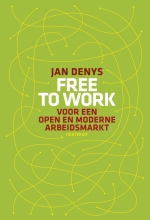The world of work is changing rapidly and it is difficult to make sense of it all. In search for a subject-matter-expert we bumped into Jan Denys. His latest book offers us more than one perspective on the status of work. A great starting point for this series on Love & Work.
Straight Talk
The book Free To Work is the first book to my knowledge that explains the history, problems, pitfalls and challenges of the Belgian labor market in human language.
The author Jan Denys is one of the few labor market experts in the Belgian and European landscape who have the authority to say something meaningful about it and the analytic view to dissect it properly.
In Free to Work, Denys carefully explains the challenges for society, government, organizations, employer organizations and trade unions. He puts the finger on the wounds on all levels and he nuances some trends the media have blown-up into unreasonable proportions (such as the threat of globalization, or conversely the false sense of security that arises from jobs-for-life).
One Step Beyond Analysis
And this is where most scholars would have stopped (and would have paralyzed me as a reader with lots of references and academic mumbo-jumbo). But Denys tops the book with two outstanding chapters: Sixty Proposals for an Open And Modern Labor Market (chapter 9), and Your Career (chapter 10). This last chapter zooms in on the individual level.
In the below One-Minute-Interview Jan Denys explains what this means for every single employee who gets ‘trapped’ into the comfort zone of a stable job: Your comfort zone should be coloring red when you find yourself loosing the external focus and ignoring the long-term perspective of your career.
Nowadays, there is no such thing as a lifelong job in one and the same organization. However, in times of economic crisis we see people digging themselves even deeper into the security of their job: comply more, don’t speak up, play-safe-games and even increase the inward focus.
Anchoring Your Career
Denys promotes the career anchors of Edgar Schein to cope with the identity crisis that may occur once an individual stares into the abyss of the labor market: it never hurts to get a clear perspective on who you are and what you want.
Career Anchors match the ‘who you are’ part with the ‘what you do’ part of your daily life. The more these two resonate with each other, the better your chances of finding your way. If you know that most of the people tend to build their career on their very first job, knowing what really matters for you may be worth finding out, for it may not be where you started your career.
Schein distinguishes the following Career Anchors:
- Technical/Functional competence: You like being good at something and will work to become a guru or expert. You like to be challenged and then use your skill to meet the challenge, doing the job properly and better than almost anyone else.
- General Managerial competence: Unlike technical/functional people, you want to manage. You like problem-solving and dealing with other people. You thrive on responsibility. To be successful, you will also need emotional competence.
- Autonomy/Independence: You have a primary need to work under your own rules. You avoid standards and prefer to work alone.
- Security/Stability: You seek stability and continuity as a primary factor of your live. You avoid risks and you generally prefer a job for life.
- Entrepreneurial Creativity: You like to invent things, be creative and, most of all, to run your own businesses. You differ from those who seek autonomy in that you will share the workload. You find ownership very important.
- Service/Dedication to a cause: You are driven by how you can help other people more than using their talents.
- Pure Challenge: Driven by challenge, you seek constant stimulation and difficult problems that you can tackle. You will change jobs when the current one gets boring.
- Lifestyle: You look at your whole pattern of living. Flexibility and the integration of life and work is key.
Who Is Driving Your Career?
The one thing you should remember about your job is that job-security is an illusion. Instead, you should be working on a career-strategy; and the best way to start is to see which career anchor resonates best with who you are.
Are you spending your working time in the area of your anchor? Well, then you have nothing to be afraid of; no reason to play safe by ‘fitting into the job’.
Fitting in will no longer safeguard your employment. Instead, build your career-strategy on this anchor, so you can stand-out in your career.
Series Navigation
Love & Work (Part 2) – The Meaning of Life >>



Pingback: Social Media Tools for Work & Learning » Who is Driving Your Career?()
Pingback: Luc’s Thoughts on Organizational Change » Love & Work (Part 7) – Employer Branding()